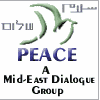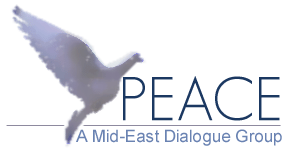
 (logos used by “PEACE”)
(logos used by “PEACE”)
“PEACE, a Mid-East Dialogue Group” was established in 1998 by Ami Isseroff from Israel and Ameen Hannoun from Jordan. They had a web presence at http://ash74.tripod.com (main site webmastered by Ameen), www.geocities.com/capitolhill/senate/5455/ (Viewpoints by Ami) and www.ariga.com/peacewatch (Ariga being the website of the late Robert Rosenberg, PeaceWatch being the section webmastered by Ami).
Read the story about PEACE here.
Only Ash74 is still available on the internet, but as an abandoned website. After the death of Robert Rosenberg in 2006, Ami moved his PeaceWatch pages to a site of his own called Yu-Hu.com (middle-east.yu-hu.com/peacewatch/). Sadly, Ami died in 2011, and the contract for Yu-Hu.com expired in the summer of 2012. As caretaker for Ami’s web work, I have decided to save this important work by republishing it here.
From PEACE came in 2000 MidEast Web for coexistence, a site webmastered by Ami and mainly filled by him, creating a huge resource for information about the Middle East Conflict and a platform for dialogue. MidEastWeb is still online, though no longer updated. A few of its Yahoo! news and dialog groups are still running, under the moderation of MidEast Web’s Paul Fays.
In 2005, Ami established another major website, called Zionism-Israel Information Center. Both MidEastWeb and Zionism-Israel are important inspirations and resources for Israel-Palestina.Info.
~ Wouter Brassé, July 2012
Charter PEACE group 1998
1. The PEACE group is dedicated to promoting peace in the Middle East through dialog and joint action of citizens of all countries in the region.
2. PEACE is not affiliated with any government or political organization, and will not allow itself to be used to advance partisan causes.
3. Peace is in the best interests of all peoples parties to the Mid-East conflict, and should be given priority in national agendas.
4. Peace can only be achieved and maintained if the desire for peace is rooted in the hearts and minds of all inhabitants of our region. It must be based on equality, mutual respect, neighborly friendship and consideration for the needs of all parties to the conflict.
5. Members of PEACE will adhere to the principles of intellectual honesty and respect for other members at all times in conducting dialogs.
6. Members of PEACE work to promote contacts between individuals, and act as citizens to persuade their own leaders to advance the cause of peace.
7. PEACE will consider any means of advancing peace suggested by members.
8. Each member has the right to act on their own in any manner they see fit. No member shall act on behalf of PEACE or in the name of PEACE without consulting other members.
9. Membership in PEACE is open to any person who subscribes to the above principles and who is willing to engage in constructive dialog and action to advance the cause of peace in the Middle East.
Declaration: A Palestinian-Israeli Peace Settlement
Following is the declaration for a Palestinian-Israeli Peace Settlement as formulated by the PEACE group circa 1998, sponsored by the PEACE Middle East Dialog Group, Breaking the Silence, the Comite pour la Sauvegarde des Accords d’Oslo (French Committee for Saving the Oslo Accords) and Interfaith Witness for Peace in the Middle East, and signed by hundreds of sympathisers.
“Peace must become the first national priority for both Israelis and Palestinians. We call on Palestinian and Israeli leaders to negotiate a peace settlement with the utmost urgency, based on these principles:”
| i. | The parties shall recognize each other as equals and declare that the same principles apply to both sides. |
| ii. | Both sides shall reaffirm their commitment to a non-violent negotiated solution. They shall condemn violence and refrain from violence to persons and property, threats of violence, incitement and unilateral provocations. |
| iii. | The parties each recognize the right of the other to self-determination in sovereign national states. |
| iv. | The Palestinian state will include all of Gaza, and nearly all of the West Bank. Inhabitants of areas ceded to the other side may remain under the sovereignty and laws of the state having jurisdiction, each taking the citizenship of their choice or dual citizenship. |
| v. | Individuals or states will be compensated for properties expropriated, lost or destroyed. |
| vi. | The Palestinian refugee problem shall be solved by compensation, dissolution of the camps and re-settlement and rehabilitation of refugees in the State of Palestine or elsewhere as they choose, provided this does not infringe upon the right to national self-determination of the Jews in Israel. |
| vii. | The settlement in Jerusalem shall express the national rights of both peoples, the rights of all religions and the civil and humanitarian rights of the inhabitants. |
| viii. | The peace agreement shall take into account the security needs of both parties. |
| ix. | The parties shall demonstrate a sincere commitment to rapprochement, non-violence, and constructive action. They shall promote peace by example, by acts of public apology, by education, cooperation and dialog at all levels, They shall cooperate to make the best use of common environmental resources, and to develop the economies of our peoples to the best mutual advantage. |
| x. | The parties shall recognize and declare that the settlement is irrevocable and final. |


